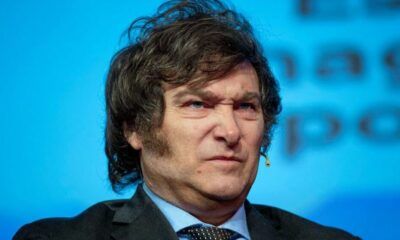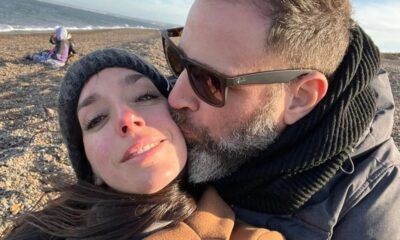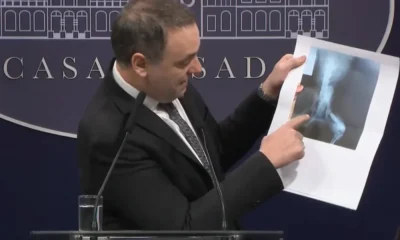INTERNACIONAL
Se pueden criticar las políticas de Israel, pero otra cosa es demonizar a los judíos

LA ADL esta denunciando un aumento del antisemitismo desde la ofensiva de Israel contra Hamas tras el ataque terrorista del 7 de octubre. ¿Es posible dimensionar el incremento?
-Nosotros buscamos, detectamos y cuantificamos el antisemitismo. Tanto las actitudes como los incidentes antisemitas. Recibimos información de víctimas, de la policía , de periodistas. Verificamos cada uno de los casos que nos reportan. Hay tres tipos de situaciones: acoso (incluye bullyng, discriminaciòn, ataques verbales), vandalismo e incidentes violentos. Ya antes del 7 de octubre las actividades antisemitas estaban elevándose en los Estados Unidos. En los últimos años se han más que duplicado. El 2022 fue el peor de los años desde que comenzamos a medir. En la última década crecieron un 900 %.
-Primero: creo que al hecho de que el antisemitismo se ha normalizado. Esto ha pasado en particular a nivel político porque hay políticos que con frecuencia apelan a estereotipos y mitos sobre los judíos y emplean términos antisemitas. Tanto de derecha como de izquierda. Segundo: considero que el populismo de ambos lados del espectro ideológico busca culpar a las élites por los problemas de la sociedad con un pensamiento conspirativo. Ocurre que cuando se ven conspiraciones por todos lados se tiende a tener actitudes antisemitas. Y tercero: las redes sociales amplifican y fortifican las afirmaciones y actitudes negativas como las noticias falsas y los discursos de odio.
-Todos estos factores se exacerbaron entonces tras la ofensiva israelí…
-Es que en un ambiente donde la gente está predispuesta al antisemtismo, a nociones antisemitas, un evento exógeno fuerte puede motivar, ser la chispa que potencie el antisemitismo. Durante la pandemia detectamos mucho antisemitismo. Hubo quienes culparon a los judíos por empezar el covid y por propagarlo y por producir la vacuna y recuperarse económicamente con la venta de la vacuna. Después del 7 de octubre están culpando a los judíos por supuestamente cometer un genocidio en Gaza. Hasta culpan a los judíos por haber causado el acto de terrorismo.
-¿No se corre el riesgo de clasificar toda crítica a decisiones políticas del gobierno israelí con una expresión de antisemitismo?
-Obviamente, se puede criticar a los gobernantes israelíes, a las políticas de Israel. Los israelíes son los primeros que lo hacen. Todo el tiempo. No hay nadie más crítico del Estado de Israel que los israelíes. Otra cosa es demonizar a los judíos. O al Estado de Israel y decir que no debería existir. Y cuando se aplica el doble estándar. Por ejemplo, la semana pasada Rusia bombardeó un colegio en Ucrania causando la muerte de 50 niños.¿Hubo alguna protesta en la calle en alguna ciudad del mundo por eso? ¿Vimos en los periódicos principales fotos de los niños muertos? ¿Escuchamos a nivel mundial a estudiantes universitarios reclamando? Quiero ser claro: cada muerte de un civil es una tragedia. Cada niño palestino, cada civil palestino que muere es una tragedia. La guerra es una tragedia. Si tu corazón no se rompe por cada niño palestino que muere en la guerra no tienes corazón. Todos deberíamos rezar por una tregua. Pero el doble estándar respecto de Israel es una manifestación de antisemitismo.
-¿Qué análisis hace de las protestas en las universidades de Estados Unidos por la ofensiva israelí en Gaza?
-Hay que decir varias cosas. Hay un pequeño grupo de profesores con una ideología muy de izquierda, muy marxista, muy anti Occidente que están alentándolo. Hay grupos estudiantiles que son muy de izquierda y algunos islamistas que también lo alientan y hasta lo lideran. Creo que están muy bien coordinados. La gran mayoría de los estudiantes no conocen las motivaciones de los líderes y enarbolan un slogan que dice “del río hasta el mar Palestina será libre”, pero no saben que eso implicaría la eliminación del Estado de Israel porque queda entre un río, el Jordán, y el mar, el Mediterráneo. Los líderes saben bien lo que significa porque está en la Constitución de Hamas que se puede leer por internet. Diría que hay mucha ignorancia respecto de algunos profesores y de muchos alumnos. La semana pasada el gobierno de los Estados Unidos estableció que Irán está financiando a los líderes estudiantiles.
-¿Qué reflexión le merece que 30 años después siga impune el atentado a la AMIA?
-El ataque a la AMIA es una herida abierta. Para Buenos Aires, para la comunidad judía, para la Argentina y para el mundo. No hubo justicia por la corrupción de algunos políticos. También por leyes que no permitieron el juicio en ausencia. A mi juicio, hay una línea recta entre el atentado a la AMIA y el 7 de octubre porque Hezbollah e Irán piensan que pueden operar con impunidad. Eso tiene que cambiar. Estoy aquí para mostrar solidaridad con nuestros hermanos de argentina, judíos y no judíos. Y demandar justicia para las víctimas.
-El presidente Javier Milei se manifiesta totalmente alineado con Israel y acaba de declarar que Hamas es para el Estado argentino una organización terrorista. ¿Qué opina?
-En cuanto a la declaración respecto de Hamas, lo consideró algo muy bueno y muy importante. Argentina es un país muy influyente en América Latina y espero que otros gobiernos de la región lo imiten. Con respecto a Milei me parece un político interesante, con un estilo diferente. Pronunció un discurso muy impresionante en la Conferencia de Davos con ideas muy fuertes sobre la economía. En el pasado este país tuvo presidentes muy corruptos. Ojalá que Milei tenga mucho éxito.
INTERNACIONAL
US top general says tensions in Middle East have ‘somewhat’ eased amid new Iranian threats
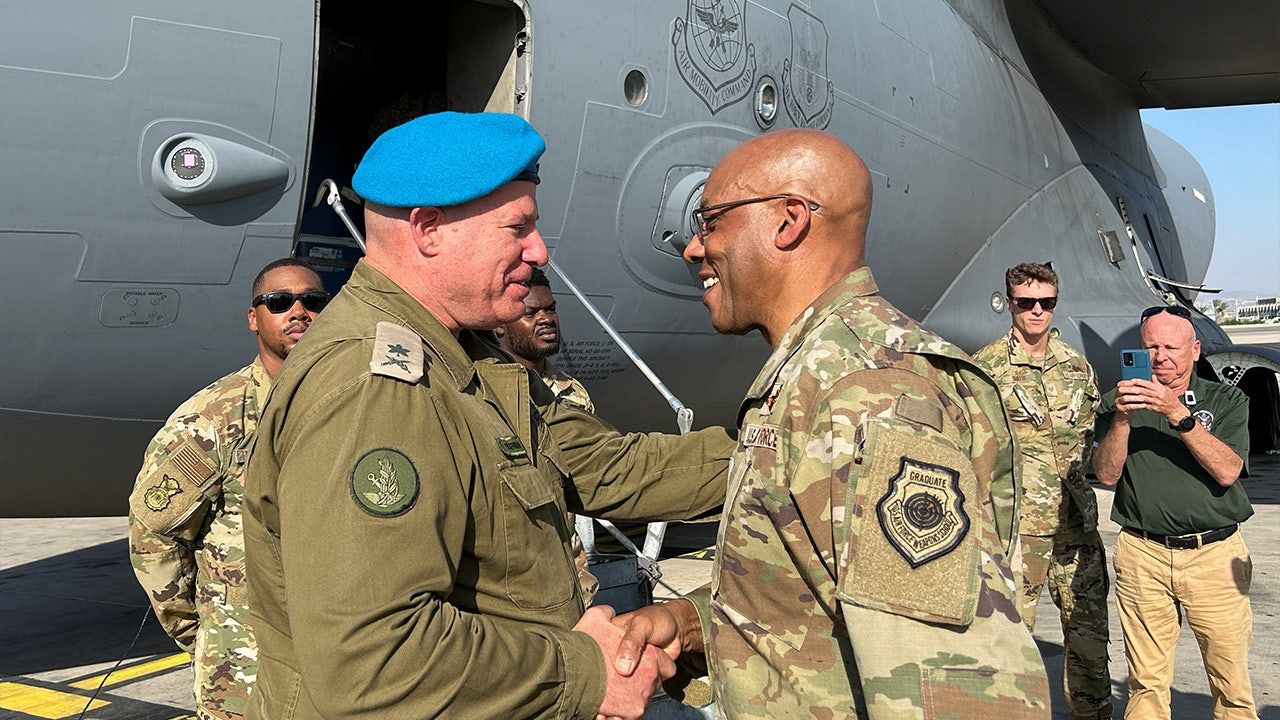
Concerns over an all-out war between Israel, Hezbollah and Iran have eased, according to comments made by U.S. Chairman of the Joint Chiefs of Staff Gen. Charles Q. Brown Jr. to Reuters on Monday, but statements issued by Jerusalem and Tehran suggest otherwise.
Brown met with top Israeli officials in Tel Aviv to discuss ongoing security issues facing Jerusalem just one day after the Israel Defense Forces and Hezbollah exchanged fire on Sunday – during which hundreds of rockets and drones were fired by the terrorist group at northern Israeli military positions.
Jerusalem said it too had fired a series of strikes on Hezbollah strongholds after 100 warplanes took to the sky to preemptively hit thousands of rocket launchers reportedly positioned to fire upon Israel.
Gen. Charles Q. Brown Jr., chairman of the Joint Chiefs of Staff, is greeted at Ben Gurion International Airport outside Tel Aviv, Israel, Aug. 26, 2024. (Reuters/Phil Stewart)
ISRAEL WARNS US DEFENSE CHIEF IRAN AGGRESSION HAS ‘REACHED ALL-TIME HIGH’
Despite the heavy fire that was exchanged, relatively few deaths were reported, with three Hezbollah militants and one Israeli soldier killed in the day’s events, which concluded by mid-morning Sunday.
When asked if the threat of a large-scale war between Israel and Hezbollah – which is backed by Iran – had abated, Brown replied, «Somewhat, yes.»
Hezbollah Secretary-General Hassan Nasrallah said the Sunday operation was ordered in response to the killing of Hezbollah commander Fuad Shukr at the end of July, reported Al Jazeera.
But the terror group and Iran have pledged retaliation for one other killing that also occurred late last month when Hamas leader Ismail Haniyeh was assassinated while visiting Tehran, though Israel has never claimed credit for the attack.
«You had two things you knew were going to happen,» Brown told reporters in detailing the two acts of revenge pledged by the Israeli adversaries. «One’s already happened. Now it depends on how the second is going to play out.»
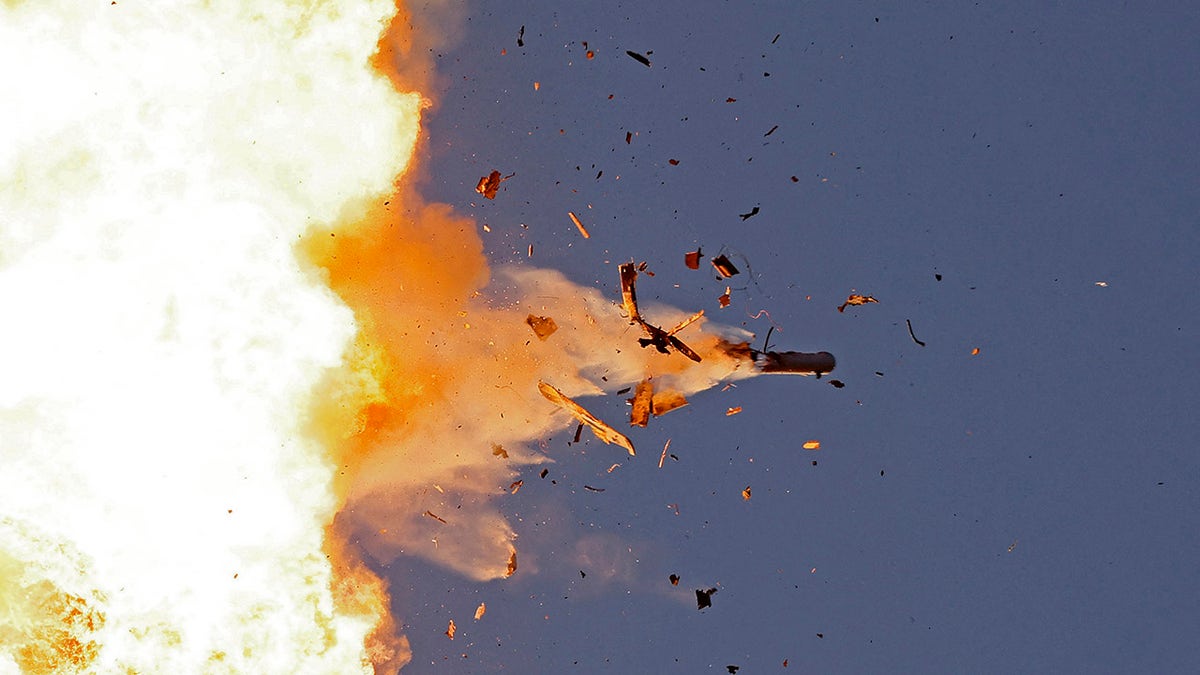
A Hezbollah UAV is intercepted by Israeli air forces over north Israel on Aug. 25, 2024. (Jalaa Marey/AFP via Getty Images)
«How Iran responds will dictate how Israel responds, which will dictate whether there is going to be a broader conflict or not,» Brown added.
Brown’s cautious optimism that a broader conflict had so far been avoided remains at odds with how Israel and Iran are viewing the current tensions.
Iran’s chief of staff of the armed forces, Maj. Gen. Mohammad Bagheri, responded to the Sunday exchange of fire and warned that «revenge against the Israeli entity is inevitable» following the death of Haniyeh.
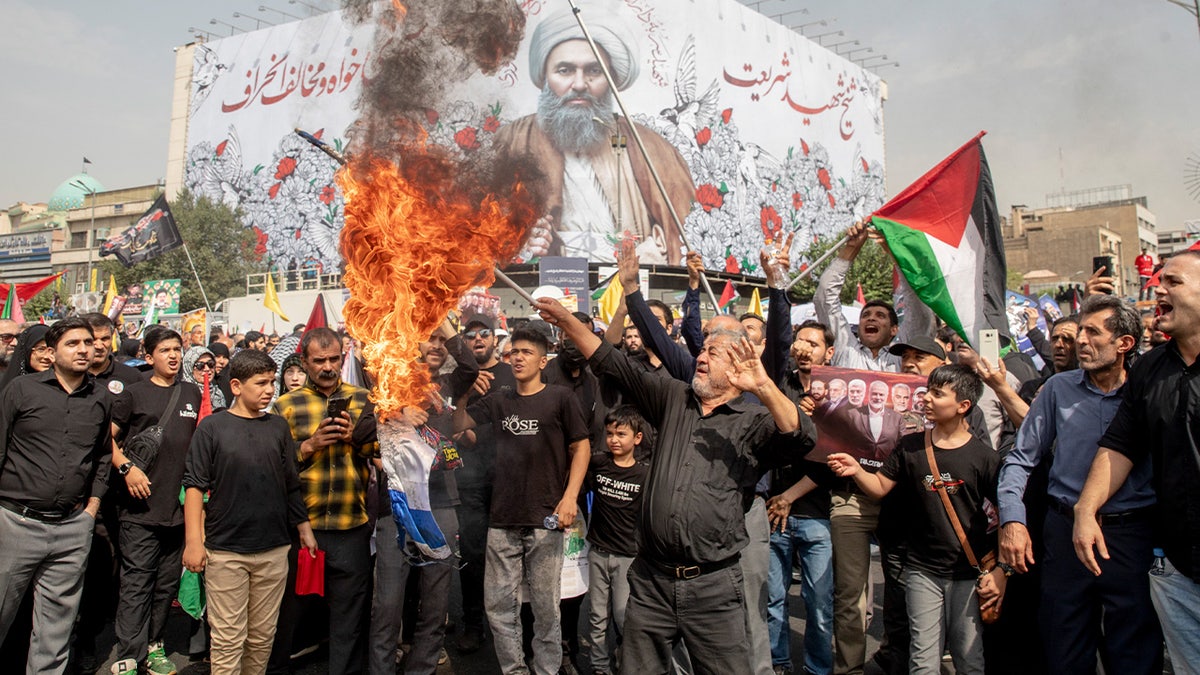
Iranians burn a representation of the Israeli flag during the funeral ceremony of Hamas leader Ismail Haniyeh on Aug. 1, 2024, in Tehran. (Majid Saeedi/Getty Images)
ISRAEL ATTACKS TARGETS IN LEBANON TO THWART HEZBOLLAH’S PREPARED STRIKES: IDF
«What we witnessed yesterday is only part of that revenge,» he confirmed, according to a report by the Arab news outlet Al Mayadeen English. «[Iran] will decide how and when to take revenge and will not fall into the trap of media provocations initiated by the enemies.»
Israel’s Defense Minister Yoav Gallant on Monday also warned that «Iran’s aggression has reached an all-time high» and said Israel and the U.S. must expand their joint defenses.
Gallant further emphasized the threat Iran poses in its continued pursuit of developing nuclear capabilities, adding that Jerusalem and Washington must work to stop Tehran’s military from gaining nuclear weapons.
On Tuesday, Iran’s supreme leader, Ayatollah Ali Khamenei, said there were no «barriers» in communicating with the «enemy,» which some news outlets interpreted as a potential signal that Tehran may once again engage in nuclear talks with the West.
«We do not have to pin our hope to the enemy. For our plans, we should not wait for approval by the enemies,» Khamenei said, according to The Associated Press. «It is not contradictory to engage the same enemy in some places, there’s no barrier.»
The AP report said this rhetoric echoed comments made in the lead-up to the 2015 deal made between Iran, the U.S. and other Western nations.
But Khamenei also warned that «the enemy» could not be trusted.
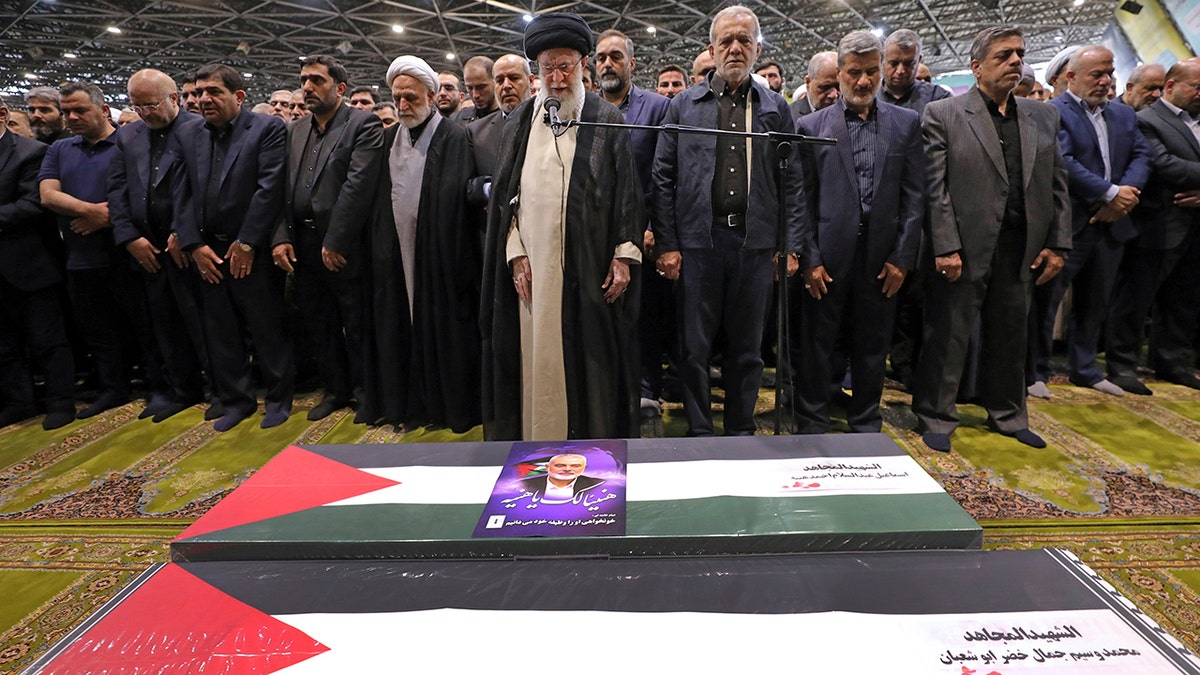
Ayatollah Ali Khamenei leads a prayer over the coffins of Hamas leader Ismail Haniyeh and his bodyguard, who were killed in an assassination blamed on Israel. (Office of the Iranian Supreme Leader via AP)
NETANYAHU VOWS MORE ‘SURPRISING BLOWS’ AFTER ISRAEL THWARTED ‘THOUSANDS’ OF HEZBOLLAH ROCKETS: ‘NOT THE END’
Talks with Iran over its nuclear development collapsed after the U.S. withdrew from the Joint Comprehensive Plan of Action (JCPOA) under the Trump administration in 2018 – a move Tehran has since claimed voided their commitments to the agreement.
The U.N. nuclear watchdog, the International Atomic Energy Agency (IAEA), said in June that Iran is not believed to possess nuclear weapon capabilities, though it has enriched uranium to levels just short of weapons-grade standards.
While any new deal with Iran appears unlikely, another «historic» deal between the U.S. and a Middle Eastern nation, Saudi Arabia, may be on the horizon, Michael Ratney, the U.S. ambassador to Saudi Arabia, said Monday.
«While we came very close and are very close on very important elements of this agreement, it is important that we finalize all of it together, and with that we would have a history-making agreement between the U.S. and Saudi,» he told Saudi news outlet Asharq Al-Awsat, according to a translation reported by Al Arabiya English.
Ratney said the agreement would encompass several issues like bolstering the strategic partnership between Washington and Riyadh, enhancing military agreements and strengthening economic ties.
But it also includes efforts to normalize ties between Saudi Arabia and Israel – a push first launched throughout the Middle East under the Trump administration’s Abraham Accords.
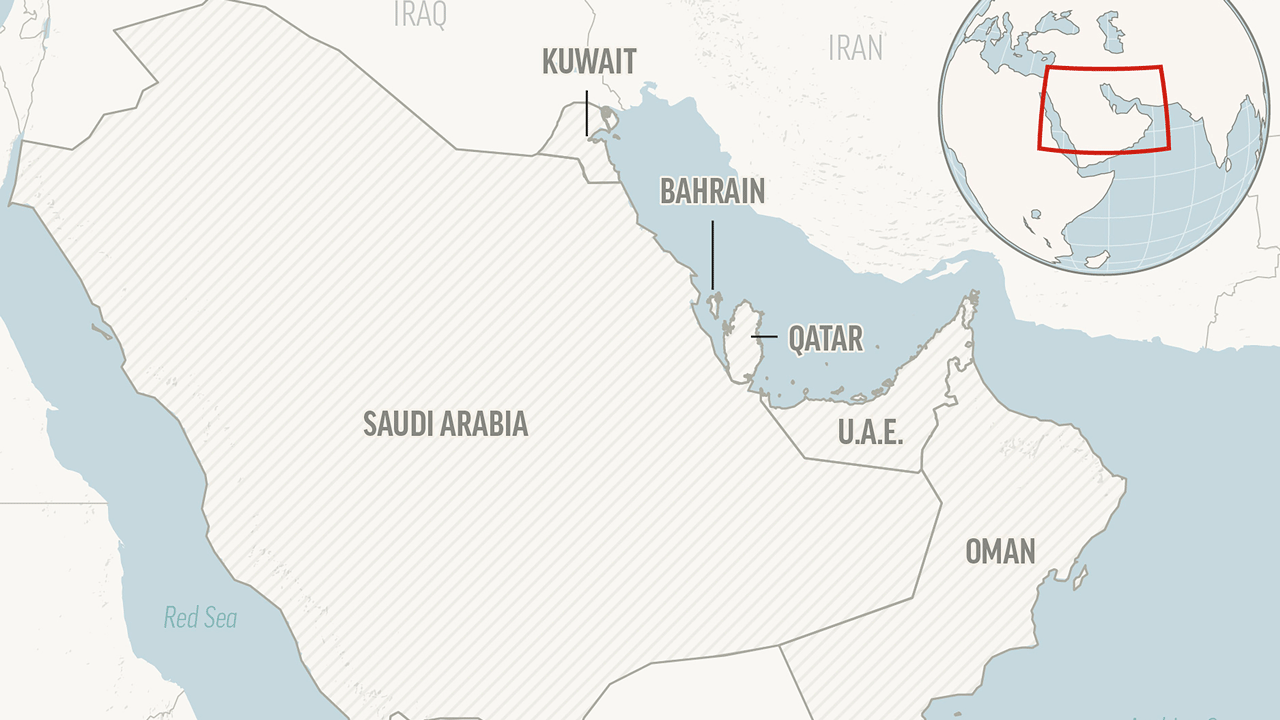
This is a locator map for the Gulf Cooperation Council member states: Saudi Arabia, Bahrain, Qatar, Oman, Kuwait and United Arab Emirates.
Washington, under both the Trump and Biden administrations, has held the belief that improving Israel’s ties in the Middle East could better secure it from terrorist organizations as well as the Iranian regime – which is often at loggerheads with several Sunni nations.
«We are in a complicated region and there are a lot of complexities to the agreement itself, but we will do it as quickly as possible,» Ratney reportedly said.
The U.S. ambassador said the Biden administration and Riyadh support the establishment of a two-state solution when it comes to stopping the Israeli-Palestinian conflict – though Israeli Prime Minister Benjamin Netanyahu has repeatedly made it clear he does not support Palestinian statehood.
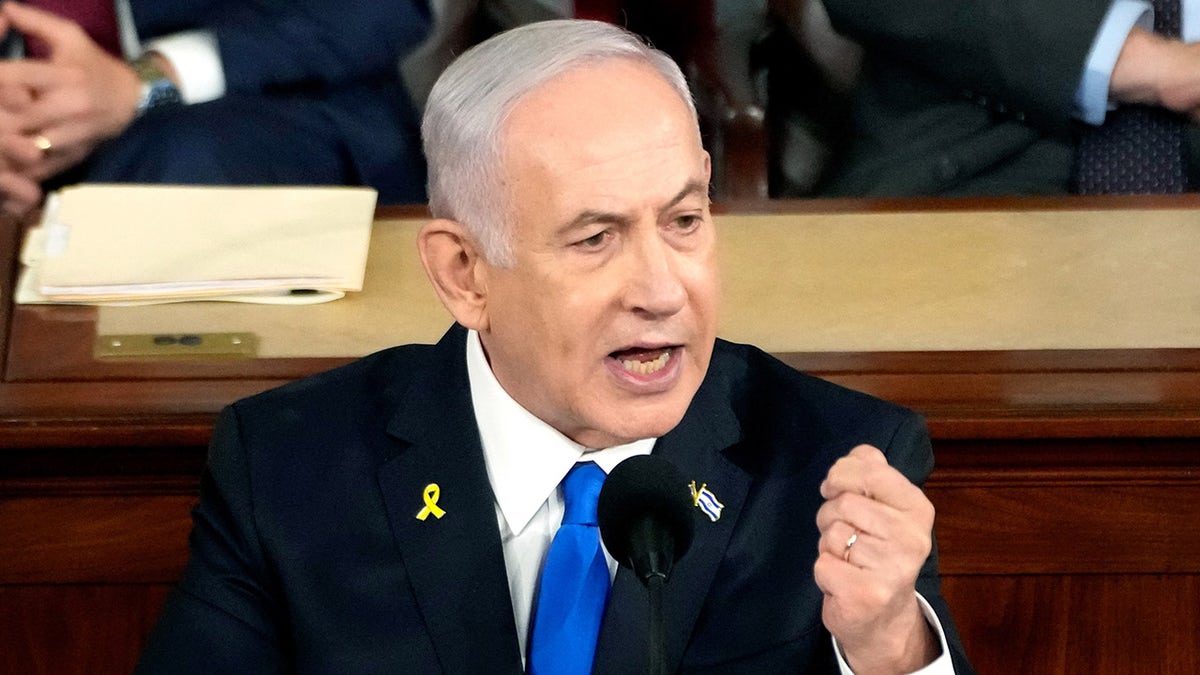
Israeli Prime Minister Benjamin Netanyahu addresses a joint meeting of Congress at the U.S. Capitol on July 24, 2024. (Kent Nishimura/Getty Images)
CLICK HERE TO GET THE FOX NEWS APP
«We fundamentally believe that Palestinian statehood needs to come through a political process, through negotiations between the parties, not through any other means,» Ratney said.
«In the meantime, the deep priority is to stop the violence in Gaza, to stop the misery of the people of Gaza, to move forward with our efforts toward a cease-fire, to release Israeli hostages, and to end this conflict to find ways to deliver much-needed humanitarian assistance in Gaza,» he added.
-
POLITICA2 días ago
Milei le respondió a los senadores que aprobaron la reforma jubilatoria: “Son una manga de demagogos”
-
POLITICA1 día ago
Quién es el novio de Tamara Pettinato, el hombre que Cristina impulsó con el respaldo de La Cámpora
-
POLITICA2 días ago
El Gobierno comenzó la auditoría de 400.000 pensiones por invalidez laboral: detectaron fraude masivo
-
POLITICA15 horas ago
Denunciaron a la militante peronista Mayra Arena por defender la corrupción en la obra pública
-
CHIMENTOS2 días ago
El baile con que Evangelina Anderson enamoró a todos
-
POLITICA9 horas ago
Nuevo ataque de Milei al periodismo: dijo que hostigan a Lemoine y volvió a cargar contra O’Donnell



















